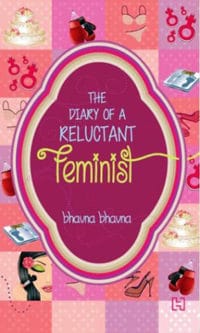CHARACTERS: 3/5
WRITING STYLE: 3/5
CLIMAX: 3/5
ENTERTAINMENT QUOTIENT: 3/5
Before starting to read any book, it is always good to read the blurb at the back as it will give you a good idea as to what the story is about and whether you are going to enjoy it.
More importantly, it gives you an insight into the author’s style as well. Essentially it gives you an indication of what you can expect from the book.
Therefore, it is important for authors to make sure that the blurb is indeed a true reflection of the book.
So, when I read the blurb of The Diary of a Reluctant Feminist by Bhavna Bhavna (there’s no mistake in the author’s name!), I was certainly interested in what the book had to offer.
It promised a compelling yet humorous account of what an Indian woman has to go through to be able to get a divorce in the country. However, the end product was disappointing.
The Diary of a Reluctant Feminist revolves around the narrator, who has been separated from her husband for over 3 years but is yet unable to get a divorce because of her parents.
It takes us through all the troubles she had had to go through as a woman in a traditional household, and how she had to do most things with the permission of her mother.
Therefore, when she tells her parents she wants to divorce her husband because they are incompatible with each other, they are aghast and take the side of the husband as he is a “good boy” and is not a womaniser or a wife beater.
Whether she can finally do it and the journey is what the book is all about.
The book starts well enough and promises to be funny and entertaining. But somewhere during the narration, the author forgets the funny and becomes more about how desperate she was to get out of all the mess.
From then on, the narration becomes more personal and the humour quotient is lost which is sad, because this could certainly have been a really funny book along with sending a message that the readers would have taken in.
The book does have certain good points, though. As already pointed out, the book starts off with some good humour, settling you nicely into the narration.
The story is written in the form of a diary, and before every chapter, there is a poem/limerick which is all very good. At the end of each chapter, there is a checklist, which in the beginning felt unique and good, but as the story went on, turned out to be more of an irritation.
The narrative should have been kept impersonal, which would have added great value to the story.
All in all, if you want to read about the travails that a woman in India has to face throughout her life, this is a good depiction. But if you are looking for a funny book, then this perhaps is not.
